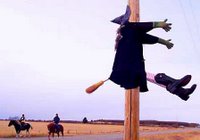My witch project
"Bewitched colonialism: the management of magic and other occult technologies"
(frases tiradas de um projecto de paper que acabei de entregar)
This project brings together the ‘magic of technology’ – as thought about in some studies on cinema during colonialism – with the colonial use of magic in order to succeed technologically (by the fixation of space through film and photo image, the magical expectations of its own technology and the colonial magical fascination with its own technology)
The dialectical process of colonial imposition called for a profound redeployment of its institutions’ meaning and a revaluation of the signs that accompanied it. The tension I will try to identify between technological apparatus and the colonial use of imagined occult forces will allow me to bridge a larger debate between 'modern' mass-mediated circuits of cultural production and the colonial backdrop that ends up sustaining them. It would be simplistic to merely state, in the age of 'technological reproducibility', that these 'modern' technologies have special 'magical' effects. Instead, what I plan to think about is if - and how - colonialism made use of its potential. As Walter Benjamin pointed out, photography revealed the ‘secret’ of the ‘optical unconscious’: the question then becomes knowing whether colonialism acknowledged consciously the power of this ‘optical unconscious’, and, if so, how it became part of colonial management.
I will show how colonial interventions in regulating and inscribing space, notably through cartography, were deeply entrenched in a projected fear of native witchcraft. But if this is not particularly surprising in the light of a certain reading of colonialism, open to suggestive reenactments in the porous influence of local contexts, it takes a different spin if one considers its broader implications on the level of 'iconological' production - and the 'magical' nature of photography, cinema or visual culture in general.
I hope to suggest, then, a magically mediated understanding of this colonial encounter. As "'go-betweens' of social transactions" images and representations of space produced in the context of taxonomic fixation or spatial regulation envelop the potential to overcome a strict reading of the construction of 'otherness'. In this sense, I propose the possibility of 'inhabiting' the colonial message – by means of reading the magical contours of its hidden properties.
Colonialism tried to monopolize the use of magic to enhance its own presence. As an embodied and living nightmare, witchcraft permeated colonialism in its everyday routines. By thinking on this colonial monopolization of a discourse and practice on magic, I suggest precisely the inexistence of a strict boundary between colonialism and modernity, on the one hand, and this magical underworld of witchcraft.
In the end, I argue, more than attempting to suppress bewitching practices, colonialism used them for its domination purposes, not always effectively. Not only does modernity allow for its ‘magical’ reenactment, as postcolonial studies have aptly demonstrated, but magic is inherently ‘modern’ as well – which says a lot about the nature of our times.

Sem comentários:
Enviar um comentário